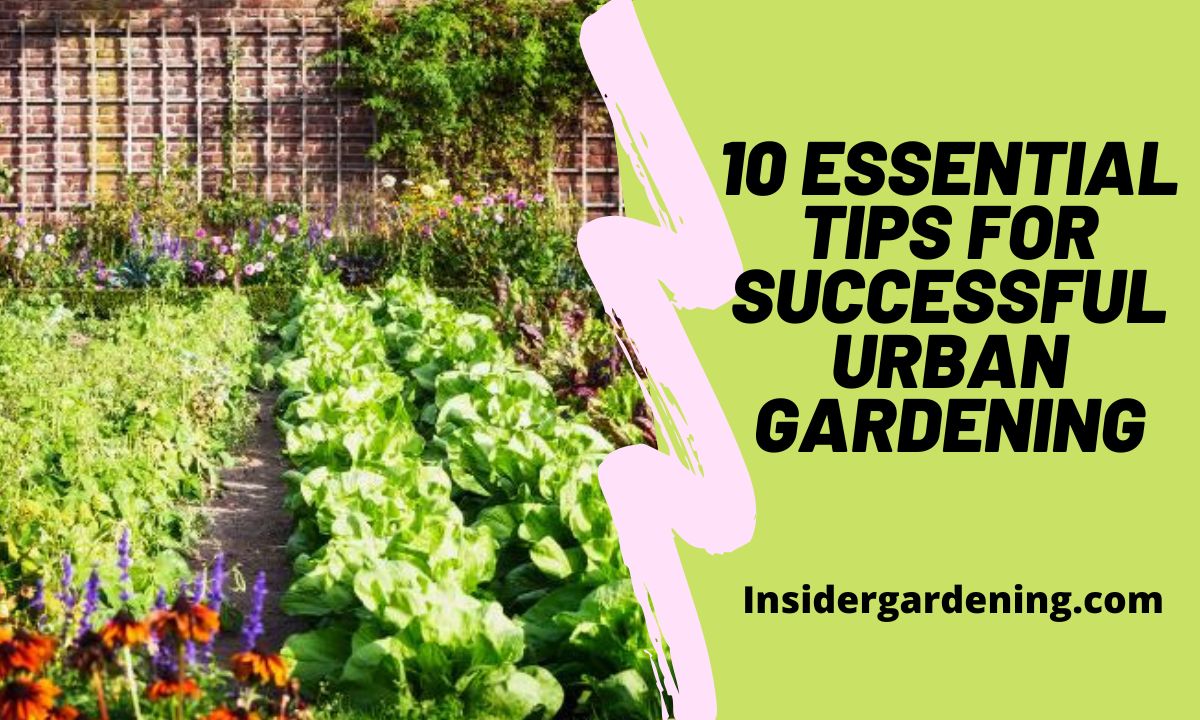10 Essential Tips for Successful Urban Gardening

Urban gardening is a wonderful way to bring nature into the city and enjoy the benefits of growing your own plants, even in limited spaces. Whether you have a small balcony, rooftop, or windowsill, these essential tips will help you achieve success in your urban gardening endeavors. From plant selection to maintenance, here are ten key guidelines to follow for a thriving urban garden.
1. Assess Your Space
Before diving into urban gardening, carefully assess your available space. Take note of the amount of sunlight your space receives, the available square footage, and any microclimates created by nearby structures. Understanding these factors will help you choose the right plants and plan your garden layout accordingly.
2. Choose the Right Plants
Select plants that are well-suited for urban gardening. Consider their light requirements, space limitations, and adaptability to containers or small beds. Opt for compact varieties, dwarf cultivars, or plants with shallow root systems that can thrive in limited spaces.
3. Use High-Quality Soil
Invest in high-quality soil or potting mix for your urban garden. Good soil provides essential nutrients, proper drainage, and a healthy growing environment for your plants. If you’re reusing soil from previous seasons, amend it with organic matter to replenish nutrients.
4. Provide Adequate Watering
Water your plants regularly, ensuring they receive enough moisture without being waterlogged. Container plants may require more frequent watering, as they tend to dry out faster than in-ground gardens. Monitor the moisture level of the soil and adjust your watering schedule accordingly.
5. Consider Vertical Gardening
Maximize your space by incorporating vertical gardening techniques. Utilize trellises, wall-mounted planters, or hanging baskets to grow plants vertically. This not only saves space but also adds visual interest to your urban garden.
6. Implement Companion Planting
Practice companion planting by growing compatible plants together. Some plants have natural pest-repellent properties or can enhance each other’s growth. For example, planting marigolds alongside vegetables can deter pests, while certain herbs can improve the flavor of nearby plants.
7. Practice Proper Pruning and Maintenance
Regularly prune and maintain your urban garden to promote healthy growth and prevent overcrowding. Remove dead or diseased plant parts promptly, as they can attract pests and hinder overall plant health. Pruning also helps maintain the desired shape and size of your plants.
8. Implement Integrated Pest Management (IPM)
Prevent and control pests using integrated pest management techniques. Regularly inspect your plants for signs of infestation, practice good hygiene in your garden, and consider natural pest control methods such as insecticidal soaps or companion planting with pest-repellent plants.
9. Utilize Organic Fertilizers
Feed your plants with organic fertilizers to provide essential nutrients without harmful chemical additives. Compost, worm castings, or organic liquid fertilizers are excellent choices for nourishing your urban garden. Follow the recommended application rates for each specific fertilizer.
10. Stay Consistent with Care
Consistency is key when it comes to urban gardening. Maintain a regular watering schedule, monitor your plants for any signs of distress or disease, and provide the necessary care and attention they require. Consistent care will help your plants thrive and ensure a successful urban garden.
Frequently Asked Questions
FAQ 1: Can I grow vegetables in small urban spaces?
Yes, you can grow vegetables in small urban spaces. Choose compact varieties and vegetables that are well-suited for container gardening or vertical gardening techniques.
FAQ 2: How can I maximize space in my urban garden?
Maximize space in your urban garden by utilizing vertical gardening techniques, such as trellises or wall-mounted planters. Consider using hanging baskets or stacking containers to make the most of your available space.
FAQ 3: Is organic gardening possible in urban areas?
Yes, organic gardening is possible in urban areas. Utilize organic fertilizers, practice integrated pest management techniques, and avoid the use of harmful chemicals to create a sustainable and eco-friendly urban garden.
Conclusion
Urban gardening is a rewarding and fulfilling endeavor that allows you to connect with nature and enjoy the beauty of plants in even the smallest of spaces. By following these essential tips for successful urban gardening, you can create a thriving garden that brings joy, beauty, and fresh produce into your urban environment. Embrace the possibilities of urban gardening and watch your garden flourish amidst the bustling cityscape.